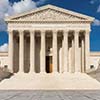Appellate Court Clarifies When School Employees are Eligible for Unemployment

May 2020
Number 36
In United Educators of San Francisco, AFT/CFT, AFL-CIO, NEA/CTA v. California Unemployment Ins. Appeals Bd. (“United Educators”), the Supreme Court of California clarified when and how educational employees might be eligible for unemployment insurance benefits during the summer break. When a school employee receives a reasonable assurance letter to work for the following school year, expects to work during summer school, but ultimately does not perform the expected work during the summer period through no fault of their own, the court held that such employee may be eligible for unemployment insurance benefits for that summer school period only if the summer school program is a “regular” term as compared with other academic terms that comprise the school year.
Background
Unemployment Insurance Code section 1253.3 states that public school employees are not eligible to collect unemployment insurance benefits during “the period between two successive academic years or terms” if the employees worked during “the first of the academic years or terms” and received “reasonable assurance” of work during “the second of the academic years or terms.” As a result, school employees who only work during the traditional academic year and are given reasonable assurance of employment for the following school year are generally ineligible for unemployment insurance benefits during the summer recess when they are not working.
In 2011, the Employment Development Department’s (EDD) denied unemployment insurance benefits to 26 San Francisco Unified School District (SFUSD) on-call substitute teachers or paraprofessional employees. All but one of the employees had received a letter in the spring of 2011 from SFUSD providing “reasonable assurance” of employment for the following 2011-2012 school year. In the summer of 2011, SFUSD operated summer school for its students. Only those who worked during the summer school session received compensation during the summer recess. The 26 employees filed their lawsuit after their claims unemployment insurance benefits for the summer recess were denied.
The Supreme Court’s Decision
The Supreme Court of California reviewed whether the limitation found in Unemployment Insurance Code section 1253.3 applied to substitute teachers and other public school employees during the summer months.
Ultimately, the Court determined that summer sessions at year-round schools, or summer sessions that, “as a whole, resemble other academic terms of the school year in terms of enrollment, staffing, budget, instructional program, or other objective criteria” qualify as “academic terms” and therefore unemployment insurance benefits are payable.
Unemployment insurance benefits are not available to employees during parts of the calendar year when they remain employed by the school district but are not expected to work. This includes Thanksgiving, winter, and spring breaks. If a school district operates a summer session, unemployment insurance benefits are only available if the summer school session is comparable to an academic term during the traditional school year in terms of enrollment, staffing, budget, or instructional program, among other things.
Takeaways
Going forward, when a claim for unemployment insurance benefits is filed by a school employee as a result of not working during a summer program, EDD and reviewing courts will consider whether that summer program as a whole resembles the school district’s other academic terms, using a variety of objective criteria. Most school districts operating under a traditional nine month school year model will likely not have “regular” summer school sessions under this new test. Even if a district’s summer term qualifies as an “academic term” this case does not provide analysis on whether and to what extent an employee’s expectation to work during summer school makes them eligible for unemployment benefits for the summer term if they ultimately do not work.
As summer school programs continue to grow, it is important for school districts to consider whether their summer program reflects a traditional academic term. If it does, employees who have received a reasonable assurance letter for the following school year may be entitled to unemployment insurance benefits for that summer period to the extent they do not work during the summer.
If you would like more information about this case, or have any questions related to payment of public employee wages and unemployment claims during, please contact the authors of this Client News Brief or an attorney at one of our eight offices located statewide. You can also subscribe to our podcast, follow us on Facebook, Twitter and LinkedIn or download our mobile app.
Number 36
In United Educators of San Francisco, AFT/CFT, AFL-CIO, NEA/CTA v. California Unemployment Ins. Appeals Bd. (“United Educators”), the Supreme Court of California clarified when and how educational employees might be eligible for unemployment insurance benefits during the summer break. When a school employee receives a reasonable assurance letter to work for the following school year, expects to work during summer school, but ultimately does not perform the expected work during the summer period through no fault of their own, the court held that such employee may be eligible for unemployment insurance benefits for that summer school period only if the summer school program is a “regular” term as compared with other academic terms that comprise the school year.
Background
Unemployment Insurance Code section 1253.3 states that public school employees are not eligible to collect unemployment insurance benefits during “the period between two successive academic years or terms” if the employees worked during “the first of the academic years or terms” and received “reasonable assurance” of work during “the second of the academic years or terms.” As a result, school employees who only work during the traditional academic year and are given reasonable assurance of employment for the following school year are generally ineligible for unemployment insurance benefits during the summer recess when they are not working.
In 2011, the Employment Development Department’s (EDD) denied unemployment insurance benefits to 26 San Francisco Unified School District (SFUSD) on-call substitute teachers or paraprofessional employees. All but one of the employees had received a letter in the spring of 2011 from SFUSD providing “reasonable assurance” of employment for the following 2011-2012 school year. In the summer of 2011, SFUSD operated summer school for its students. Only those who worked during the summer school session received compensation during the summer recess. The 26 employees filed their lawsuit after their claims unemployment insurance benefits for the summer recess were denied.
The Supreme Court’s Decision
The Supreme Court of California reviewed whether the limitation found in Unemployment Insurance Code section 1253.3 applied to substitute teachers and other public school employees during the summer months.
Ultimately, the Court determined that summer sessions at year-round schools, or summer sessions that, “as a whole, resemble other academic terms of the school year in terms of enrollment, staffing, budget, instructional program, or other objective criteria” qualify as “academic terms” and therefore unemployment insurance benefits are payable.
Unemployment insurance benefits are not available to employees during parts of the calendar year when they remain employed by the school district but are not expected to work. This includes Thanksgiving, winter, and spring breaks. If a school district operates a summer session, unemployment insurance benefits are only available if the summer school session is comparable to an academic term during the traditional school year in terms of enrollment, staffing, budget, or instructional program, among other things.
Takeaways
Going forward, when a claim for unemployment insurance benefits is filed by a school employee as a result of not working during a summer program, EDD and reviewing courts will consider whether that summer program as a whole resembles the school district’s other academic terms, using a variety of objective criteria. Most school districts operating under a traditional nine month school year model will likely not have “regular” summer school sessions under this new test. Even if a district’s summer term qualifies as an “academic term” this case does not provide analysis on whether and to what extent an employee’s expectation to work during summer school makes them eligible for unemployment benefits for the summer term if they ultimately do not work.
As summer school programs continue to grow, it is important for school districts to consider whether their summer program reflects a traditional academic term. If it does, employees who have received a reasonable assurance letter for the following school year may be entitled to unemployment insurance benefits for that summer period to the extent they do not work during the summer.
If you would like more information about this case, or have any questions related to payment of public employee wages and unemployment claims during, please contact the authors of this Client News Brief or an attorney at one of our eight offices located statewide. You can also subscribe to our podcast, follow us on Facebook, Twitter and LinkedIn or download our mobile app.
As the information contained herein is necessarily general, its application to a particular set of facts and circumstances may vary. For this reason, this News Brief does not constitute legal advice. We recommend that you consult with your counsel prior to acting on the information contained herein.






